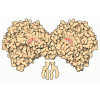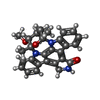[English] 日本語
 Yorodumi
Yorodumi- PDB-5e8y: TGF-BETA RECEPTOR TYPE 2 KINASE DOMAIN (E431A,R433A,E485A,K488A,R... -
+ Open data
Open data
- Basic information
Basic information
| Entry | Database: PDB / ID: 5e8y | ||||||
|---|---|---|---|---|---|---|---|
| Title | TGF-BETA RECEPTOR TYPE 2 KINASE DOMAIN (E431A,R433A,E485A,K488A,R493A,R495A) IN COMPLEX WITH STAUROSPORINE | ||||||
 Components Components | TGF-beta receptor type-2 | ||||||
 Keywords Keywords | TRANSFERASE/TRANSFERASE INHIBITOR / KINASE DOMAIN / TRANSFERASE-TRANSFERASE INHIBITOR COMPLEX | ||||||
| Function / homology |  Function and homology information Function and homology informationpositive regulation of tolerance induction to self antigen / positive regulation of B cell tolerance induction / inferior endocardial cushion morphogenesis / transforming growth factor beta receptor activity, type II / bronchus morphogenesis / mammary gland morphogenesis / lens fiber cell apoptotic process / growth plate cartilage chondrocyte growth / tricuspid valve morphogenesis / TGFBR2 MSI Frameshift Mutants in Cancer ...positive regulation of tolerance induction to self antigen / positive regulation of B cell tolerance induction / inferior endocardial cushion morphogenesis / transforming growth factor beta receptor activity, type II / bronchus morphogenesis / mammary gland morphogenesis / lens fiber cell apoptotic process / growth plate cartilage chondrocyte growth / tricuspid valve morphogenesis / TGFBR2 MSI Frameshift Mutants in Cancer / miRNA transport / transforming growth factor beta ligand-receptor complex / aorta morphogenesis / type III transforming growth factor beta receptor binding / positive regulation of epithelial to mesenchymal transition involved in endocardial cushion formation / Langerhans cell differentiation / TGFBR2 Kinase Domain Mutants in Cancer / transforming growth factor beta receptor activity / cardiac left ventricle morphogenesis / secondary palate development / SMAD2/3 Phosphorylation Motif Mutants in Cancer / TGFBR1 KD Mutants in Cancer / endocardial cushion fusion / positive regulation of T cell tolerance induction / TGFBR3 regulates TGF-beta signaling / membranous septum morphogenesis / positive regulation of NK T cell differentiation / activin receptor complex / activin receptor activity, type I / lung lobe morphogenesis / receptor protein serine/threonine kinase / transmembrane receptor protein serine/threonine kinase activity / activin binding / regulation of stem cell proliferation / TGFBR1 LBD Mutants in Cancer / SMAD protein signal transduction / type I transforming growth factor beta receptor binding / myeloid dendritic cell differentiation / embryonic cranial skeleton morphogenesis / activin receptor signaling pathway / glycosaminoglycan binding / positive regulation of CD4-positive, alpha-beta T cell proliferation / regulation of stem cell differentiation / outflow tract septum morphogenesis / response to cholesterol / transforming growth factor beta binding / kinase activator activity / aortic valve morphogenesis / lens development in camera-type eye / atrioventricular valve morphogenesis / embryonic hemopoiesis / positive regulation of mesenchymal cell proliferation / artery morphogenesis / trachea formation / smoothened signaling pathway / branching involved in blood vessel morphogenesis / ventricular septum morphogenesis / blood vessel development / heart looping / SMAD binding / TGF-beta receptor signaling activates SMADs / outflow tract morphogenesis / roof of mouth development / positive regulation of SMAD protein signal transduction / positive regulation of epithelial cell migration / epithelial to mesenchymal transition / positive regulation of epithelial to mesenchymal transition / vasculogenesis / Downregulation of TGF-beta receptor signaling / gastrulation / Notch signaling pathway / TGF-beta receptor signaling in EMT (epithelial to mesenchymal transition) / transforming growth factor beta receptor signaling pathway / brain development / caveola / cellular response to growth factor stimulus / positive regulation of angiogenesis / positive regulation of reactive oxygen species metabolic process / UCH proteinases / nervous system development / regulation of cell population proliferation / regulation of gene expression / heart development / molecular adaptor activity / in utero embryonic development / receptor complex / nuclear body / membrane raft / response to xenobiotic stimulus / external side of plasma membrane / protein serine/threonine kinase activity / positive regulation of cell population proliferation / apoptotic process / extracellular space / extracellular region / ATP binding / metal ion binding / membrane / plasma membrane / cytosol Similarity search - Function | ||||||
| Biological species |  Homo sapiens (human) Homo sapiens (human) | ||||||
| Method |  X-RAY DIFFRACTION / X-RAY DIFFRACTION /  SYNCHROTRON / SYNCHROTRON /  MOLECULAR REPLACEMENT / Resolution: 2.05 Å MOLECULAR REPLACEMENT / Resolution: 2.05 Å | ||||||
 Authors Authors | Sheriff, S. | ||||||
 Citation Citation |  Journal: Acta Crystallogr D Struct Biol / Year: 2016 Journal: Acta Crystallogr D Struct Biol / Year: 2016Title: Crystal structures of apo and inhibitor-bound TGF beta R2 kinase domain: insights into TGF beta R isoform selectivity. Authors: Tebben, A.J. / Ruzanov, M. / Gao, M. / Xie, D. / Kiefer, S.E. / Yan, C. / Newitt, J.A. / Zhang, L. / Kim, K. / Lu, H. / Kopcho, L.M. / Sheriff, S. | ||||||
| History |
|
- Structure visualization
Structure visualization
| Structure viewer | Molecule:  Molmil Molmil Jmol/JSmol Jmol/JSmol |
|---|
- Downloads & links
Downloads & links
- Download
Download
| PDBx/mmCIF format |  5e8y.cif.gz 5e8y.cif.gz | 77.1 KB | Display |  PDBx/mmCIF format PDBx/mmCIF format |
|---|---|---|---|---|
| PDB format |  pdb5e8y.ent.gz pdb5e8y.ent.gz | 54.2 KB | Display |  PDB format PDB format |
| PDBx/mmJSON format |  5e8y.json.gz 5e8y.json.gz | Tree view |  PDBx/mmJSON format PDBx/mmJSON format | |
| Others |  Other downloads Other downloads |
-Validation report
| Summary document |  5e8y_validation.pdf.gz 5e8y_validation.pdf.gz | 878.1 KB | Display |  wwPDB validaton report wwPDB validaton report |
|---|---|---|---|---|
| Full document |  5e8y_full_validation.pdf.gz 5e8y_full_validation.pdf.gz | 880.6 KB | Display | |
| Data in XML |  5e8y_validation.xml.gz 5e8y_validation.xml.gz | 13.4 KB | Display | |
| Data in CIF |  5e8y_validation.cif.gz 5e8y_validation.cif.gz | 18.4 KB | Display | |
| Arichive directory |  https://data.pdbj.org/pub/pdb/validation_reports/e8/5e8y https://data.pdbj.org/pub/pdb/validation_reports/e8/5e8y ftp://data.pdbj.org/pub/pdb/validation_reports/e8/5e8y ftp://data.pdbj.org/pub/pdb/validation_reports/e8/5e8y | HTTPS FTP |
-Related structure data
| Related structure data |  5e8sC 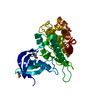 5e8tC  5e8uC  5e8vC 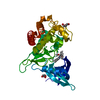 5e8wC 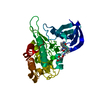 5e8xC 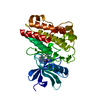 5e8zC 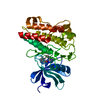 5e90C 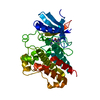 5e91C 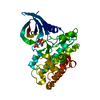 5e92C  3tzmS C: citing same article ( S: Starting model for refinement |
|---|---|
| Similar structure data |
- Links
Links
- Assembly
Assembly
| Deposited unit | 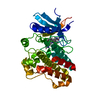
| ||||||||
|---|---|---|---|---|---|---|---|---|---|
| 1 |
| ||||||||
| Unit cell |
|
- Components
Components
| #1: Protein | Mass: 35840.680 Da / Num. of mol.: 1 / Fragment: KINASE DOMAIN, UNP RESIDUES 237-549 / Mutation: E431A,R433A,E485A,K488A,R493A,R495A Source method: isolated from a genetically manipulated source Source: (gene. exp.)  Homo sapiens (human) / Gene: TGFBR2 / Plasmid: PFASTBAC1 / Production host: Homo sapiens (human) / Gene: TGFBR2 / Plasmid: PFASTBAC1 / Production host:  References: UniProt: P37173, receptor protein serine/threonine kinase |
|---|---|
| #2: Chemical | ChemComp-STU / |
| #3: Water | ChemComp-HOH / |
-Experimental details
-Experiment
| Experiment | Method:  X-RAY DIFFRACTION / Number of used crystals: 1 X-RAY DIFFRACTION / Number of used crystals: 1 |
|---|
- Sample preparation
Sample preparation
| Crystal | Density Matthews: 2.58 Å3/Da / Density % sol: 52.3 % |
|---|---|
| Crystal grow | Temperature: 277 K / Method: vapor diffusion, hanging drop / pH: 8.5 Details: 100 mm TRIS-HCl, PH 8.5, 150 mm MgCl2, 24%(w/v) PEG4000, 20%(v/v) glcyerol |
-Data collection
| Diffraction | Mean temperature: 100 K |
|---|---|
| Diffraction source | Source:  SYNCHROTRON / Site: SYNCHROTRON / Site:  APS APS  / Beamline: 17-ID / Wavelength: 1 Å / Beamline: 17-ID / Wavelength: 1 Å |
| Detector | Type: DECTRIS PILATUS 6M / Detector: PIXEL / Date: Mar 19, 2015 |
| Radiation | Protocol: SINGLE WAVELENGTH / Monochromatic (M) / Laue (L): M / Scattering type: x-ray |
| Radiation wavelength | Wavelength: 1 Å / Relative weight: 1 |
| Reflection | Resolution: 2.05→37.99 Å / Num. obs: 23791 / % possible obs: 99.9 % / Observed criterion σ(I): 0 / Redundancy: 6.3 % / Biso Wilson estimate: 38.2 Å2 / Rsym value: 0.075 / Net I/σ(I): 12.9 |
| Reflection shell | Resolution: 2.05→2.29 Å / Redundancy: 6.4 % / Rmerge(I) obs: 0.434 / Mean I/σ(I) obs: 3.3 / Rejects: 0 / % possible all: 100 |
- Processing
Processing
| Software |
| ||||||||||||||||||||||||||||||||||||||||||||||||||||||||||||||||||||||||||||||||||||||||||||||||||||||||||||
|---|---|---|---|---|---|---|---|---|---|---|---|---|---|---|---|---|---|---|---|---|---|---|---|---|---|---|---|---|---|---|---|---|---|---|---|---|---|---|---|---|---|---|---|---|---|---|---|---|---|---|---|---|---|---|---|---|---|---|---|---|---|---|---|---|---|---|---|---|---|---|---|---|---|---|---|---|---|---|---|---|---|---|---|---|---|---|---|---|---|---|---|---|---|---|---|---|---|---|---|---|---|---|---|---|---|---|---|---|---|
| Refinement | Method to determine structure:  MOLECULAR REPLACEMENT MOLECULAR REPLACEMENTStarting model: 3TZM Resolution: 2.05→31.63 Å / Cor.coef. Fo:Fc: 0.9297 / Cor.coef. Fo:Fc free: 0.9062 / SU R Cruickshank DPI: 0.166 / Cross valid method: THROUGHOUT / σ(F): 0 / SU R Blow DPI: 0.168 / SU Rfree Blow DPI: 0.148 / SU Rfree Cruickshank DPI: 0.147
| ||||||||||||||||||||||||||||||||||||||||||||||||||||||||||||||||||||||||||||||||||||||||||||||||||||||||||||
| Displacement parameters | Biso max: 112.08 Å2 / Biso mean: 42.63 Å2 / Biso min: 23.58 Å2
| ||||||||||||||||||||||||||||||||||||||||||||||||||||||||||||||||||||||||||||||||||||||||||||||||||||||||||||
| Refine analyze | Luzzati coordinate error obs: 0.267 Å | ||||||||||||||||||||||||||||||||||||||||||||||||||||||||||||||||||||||||||||||||||||||||||||||||||||||||||||
| Refinement step | Cycle: final / Resolution: 2.05→31.63 Å
| ||||||||||||||||||||||||||||||||||||||||||||||||||||||||||||||||||||||||||||||||||||||||||||||||||||||||||||
| Refine LS restraints |
| ||||||||||||||||||||||||||||||||||||||||||||||||||||||||||||||||||||||||||||||||||||||||||||||||||||||||||||
| LS refinement shell | Resolution: 2.05→2.14 Å / Total num. of bins used: 12
|
 Movie
Movie Controller
Controller



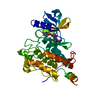
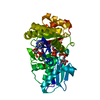
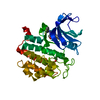

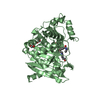
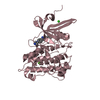
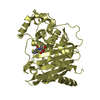
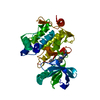
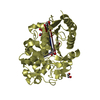
 PDBj
PDBj